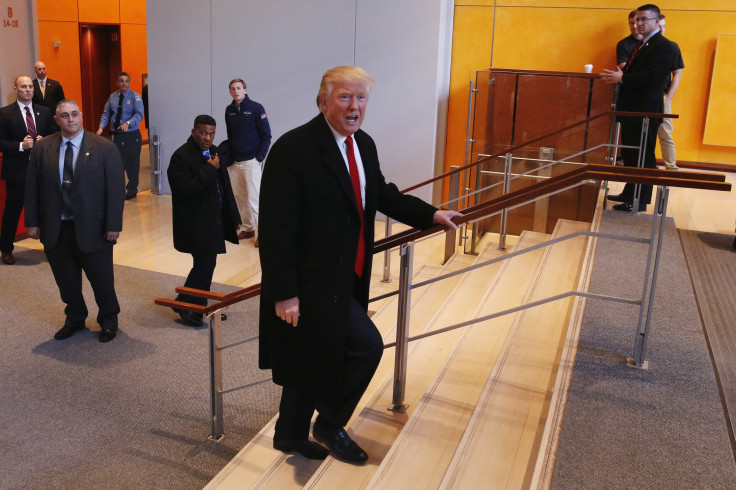What Is Donald Trump's Position On Climate Change? President-Elect Softens His Stance

President-elect Donald Trump Tuesday appeared to soften his position on climate change, conceding “some connectivity” between human activity and global warming.
The international community has expressed concern Trump would pull the United States out of the Paris accord, which sets specific targets for reducing carbon emissions and was signed by more than 190 countries. Though the United States cannot pull out for four years, there are no enforcement mechanisms if countries violate its provisions although some signatories are discussing ways of punishing the U.S. if Trump pulls out.
U.N. Secretary-General Ban Ki-moon predicted Trump would change his views on climate change, which he has described as a Chinese hoax. Ban said market forces alone would convince the businessman-turned-politician of the wisdom of addressing the issue.
"I think there is some connectivity. Some, something. It depends on how much," Trump said Tuesday during a meeting with the New York Times.
During the campaign, Trump pledged to withdraw from the Paris agreement but hedged when pressed on the issue Tuesday, saying he is “looking at it very closely” and has “an open mind.”
Tom Friedman asks if Trump will withdraw from climate change accords. Trump: “I’m looking at it very closely. I have an open mind to it."
— Michael M. Grynbaum (@grynbaum) November 22, 2016
Does Trump think human activity is linked to climate change? “I think there is some connectivity. Some, something. It depends on how much."
— Michael M. Grynbaum (@grynbaum) November 22, 2016
On climate change, Trump says he is also thinking about "how much it will cost our companies” & the effect on American competitiveness.
— Michael M. Grynbaum (@grynbaum) November 22, 2016
Much of Trump’s campaign rhetoric railed against environmental regulations and the burden they present to U.S. businesses. Climate change activists worry Trump will roll back progress made in the last eight years.
Among Trump’s advisers is Myron Ebell of the Competitive Enterprise Institute, a climate change denier tasked with overseeing the Environmental Protection Agency’s transition. He also is on the list of candidates to head the agency.
Monday night, Trump outlined his initial objectives once taking office. Among them was eliminating two government regulations for each new rule proposed.
“I really do think there will be some kind of reversal of Obama-era policies, but there are legal, political, and practical constraints on how far the Trump administration can go,” Jody Freeman, the director of Harvard University’s environmental law and policy program, told the Daily Signal in an interview.
Ebell told the Daily Signal he and his colleagues acknowledge carbon dioxide is a greenhouse gas and greenhouse gases will contribute to an increase in temperatures, but says the situation is not a “crisis that requires drastic action.” He said President Barack Obama’s climate strategy will have a minimal impact on global warming but will threaten the economy.
NASA data indicated October was the second hottest month on record with 2016 heading for the title of hottest year.
"The disaster that Donald Trump represents for the climate cannot be understated," Jamie Henn, a spokesman for the environmental advocacy group 350.org, told CNN last week. "He is the only head of state in the world who is an all-out climate denier and he has the most radical, anti-environmental policies of anyone to ever assume the role of the presidency."
© Copyright IBTimes 2025. All rights reserved.






















